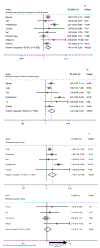Associations Between Anxiety and Adherence to Antiretroviral Medications in Low- and Middle-Income Countries: A Systematic Review and Meta-analysis
- PMID: 30659424
- PMCID: PMC6639150
- DOI: 10.1007/s10461-018-02390-8
Associations Between Anxiety and Adherence to Antiretroviral Medications in Low- and Middle-Income Countries: A Systematic Review and Meta-analysis
Abstract
Untreated mental health disorders among people living with HIV (PLHIV) may prevent low- and middle-income countries (LMICs) from achieving the UNAIDS 90-90-90 targets. Anxiety disorders may be associated with decreased adherence to antiretroviral therapy (ART). We sought to review and meta-analyze studies estimating associations between anxiety and ART adherence in LMICs. We searched PubMed, PsychINFO, CINAHL and EMBASE for relevant studies published before July 18, 2018. We defined anxiety as reported anxiety scores from screening questionnaires or having a clinical diagnosis of an anxiety disorder, and poor ART adherence as missed doses, poor visit attendance, or scores from structured adherence questionnaires. We used a random effects model to conduct a meta-analysis for calculating a pooled odds ratio, and conducted sensitivity analyses by time on ART, anxiety evaluation method, and study region. From 472 screened manuscripts, thirteen studies met our inclusion criteria. Eleven studies were included in the meta-analysis. PLHIV who reported anxiety had 59% higher odds of poor ART adherence compared with those who did not report anxiety disorder (pooled odds ratio [pOR]: 1.59, 95% confidence interval [CI] 1.29-1.96, p < 0.001). When excluding PLHIV who initiated ART within 6 months, reported anxiety remained strongly associated with poor ART adherence (pOR: 1.61, 95% CI 1.18-2.20, p = 0.003). Among PLHIV in LMICs, reported anxiety was associated with poor ART adherence. This association persisted after the ART initiation period. Increased resources for mental health may be important for achieving virologic suppression in LMICs.
Keywords: Adherence; Antiretroviral therapy; Anxiety; HIV; Low-income countries.
Conflict of interest statement
Figures
References
-
- UNAIDS. 90–90-90 An ambitious treatment target to help end the AIDS epidemic United Nations; 2014.
-
- UNAIDS. Ending Aids Progress Towards the 90–90-90 Targets. Glob Aids Updat [Internet] 2017;198 Available from: http://www.unaids.org/sites/default/files/media_asset/Global_AIDS_update...
-
- Demyttenaere K, Bruffaerts R, Posada-Villa J, Gasquet I, Kovess V, Lepine JP, et al. Prevalence, severity, and unmet need for treatment of mental disorders in the World Health Organization World Mental Health Surveys. JAMA 2004. June;291(21):2581–90. - PubMed
-
- World Health Organization. Mental Health Atlas Vol. 93, Bulletin of the World Health Organization; 2015.
-
- Nakimuli-Mpungu E, Bass JK, Alexandre P, Mills EJ, Musisi S, Ram M, et al. Depression, alcohol use and adherence to antiretroviral therapy in sub-Saharan Africa: A systematic review. AIDS Behav 2012;16(8):2101–8. - PubMed
Publication types
MeSH terms
Substances
Grants and funding
LinkOut - more resources
Full Text Sources
Other Literature Sources
Medical
Miscellaneous




